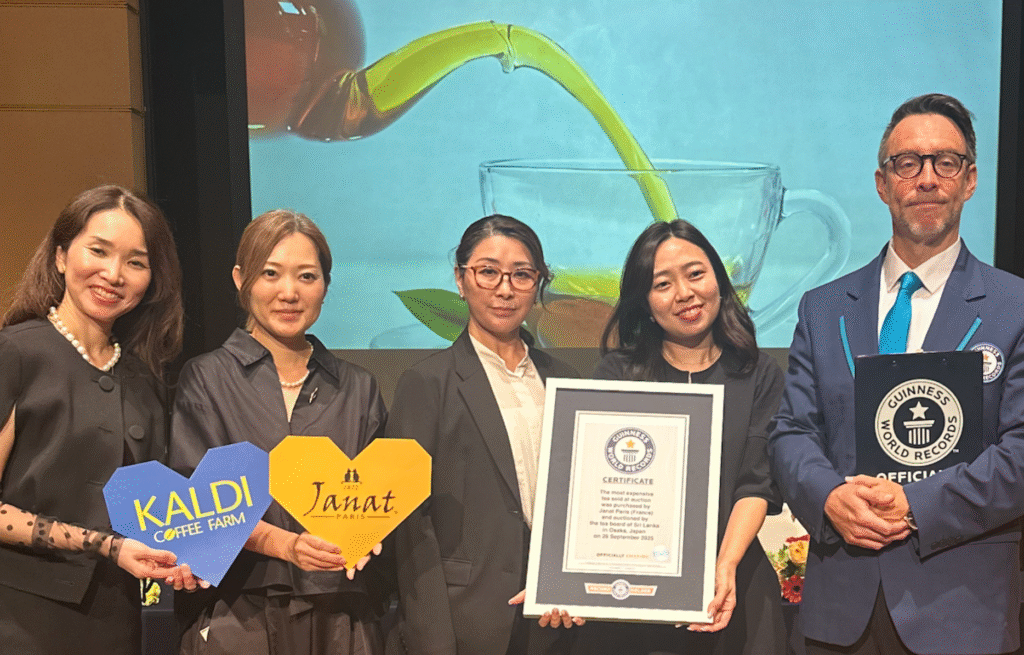A pioneering fusion of ancient tea craftsmanship and frontier biotechnology marks a new chapter for luxury beverages, regenerative farming, and human longevity.
In a breakthrough moment for the global tea industry, JANAT PARIS has unveiled the world’s first microbiome-enhanced black tea, a scientific and artisanal milestone that has officially earned a Guinness World Record at Expo 2025 Osaka for the most expensive tea ever sold. Cultivated deep within Sri Lanka’s rainforest using proprietary microbial technology, the tea represents a dramatic leap in how terroir, biotechnology, and wellness can converge in a single cup.
At the heart of this innovation is Aquabiota, a proprietary probiotic biofertilizer developed by INNOVATION LABO, Japan’s leading microbiome biotechnology platform. Aquabiota originates from the native microbiome of a 950-year-old sacred tree thriving in the volcanic soils of Kagoshima’s Gozen Plantation. This ancient microbial ecosystem, shaped over centuries of volcanic activity, was isolated, cultured, and adapted to the distinct terroir of Sri Lanka’s premium tea regions.
A key component of this formulation is Lactobacillus fermentum IL-108, a rare strain known for revitalizing soil microbial diversity, increasing nutrient bioavailability, enhancing plant resistance to drought and heat, and improving photosynthetic efficiency. Once applied to the tea fields, this living microbial consortium restored soil fertility, activated plant defense genes, and amplified the biochemical richness of the leaves, resulting in naturally elevated levels of amino acids, antioxidants, and aromatic compounds.
The resulting black tea offers a sensory and functional profile unlike anything previously produced. It delivers a richer aroma, deeper body, and longer finish, characteristics supported by biochemical analyses indicating heightened concentrations of L-theanine, catechins, polyphenols, and probiotic metabolites. These compounds collectively support cognitive relaxation, cellular protection, metabolic wellness, and even the gut–skin axis, contributing to improved hydration, elasticity, and luminosity. At a ceremonial auction hosted by the Sri Lanka Tea Board, the tea achieved a record-setting valuation, underscoring both its rarity and the transformative scientific approach behind its creation.
The debut marks a turning point for microbiome-driven agriculture. As global tea producers grapple with soil degradation, climate volatility, and increasing dependence on chemical inputs, the partnership between JANAT PARIS and INNOVATION LABO demonstrates how microbial intelligence can regenerate ecosystems, improve nutrient density, and support climate-resilient cultivation practices. Through a synergistic blend of ancient cultivation expertise and modern microbiome science, the project showcases how regenerative stewardship can reduce chemical dependency while enhancing biodiversity and unlocking a new dimension of sensory complexity known as microbial terroir.
Unveiled at Expo 2025 Osaka, the record-breaking tea captured the attention of buyers, scientists, and media from around the world. The showcase positioned Ceylon tea not merely as a heritage commodity but as a frontier platform for longevity science, regenerative agriculture, and high-value functional foods. As microbiome-enhanced crops gain global traction, the JANAT–INNOVATION LABO breakthrough signals a future in which agriculture evolves into a living, intelligent ecosystem capable of supporting both planetary health and human well-being.
Building on the success of Aquabiota, INNOVATION LABO plans to scale its microbiome platform across agriculture, nutrition, cosmetics, and wellness. The company is actively forging partnerships with research institutes, premium tea producers, and next-generation health brands worldwide, advancing its mission to transform microbial intelligence into real-world solutions that strengthen sustainability, resilience, and longevity. Through this vision, microbiome-based innovation is poised to become a cornerstone of the sustainable industries of the future.


AloJapan.com